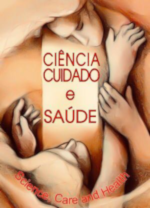Weaknesses and strengths in the teaching of non-communicable chronic diseases in nursing undergraduate training
Abstract
Objective: to analyze the weaknesses and strengths in the professional training process of nurses regarding the care of people with chronic non-communicable diseases. Methods: this is a qualitative, analytical and exploratory research of the case report type. Data collection was carried out in the undergraduate nursing course of a university in the Southern Region of Brazil. Interviews were conducted with students and teachers and a documentary analysis of the Course's Political Pedagogical Project and Teaching Plans was carried out. Results: among the fragilities, the following subcategories were identified: organization of the curriculum matrix as a limiting factor in the learning scenarios of the practice and invisibility of the family in the care context. As a strength, the following subcategory was identified: research and outreach activities related to chronic diseases. Conclusion: implementing a course in line with the National Curriculum Guidelines for Undergraduate Nursing Courses is a challenging task. It is concluded that there is a movement in favor of the articulation between teaching, research and outreach activities to meet the demands of the health sector and mainly aimed at viability so that the vast majority of students may be able to participate. However, it is essential to revise the Course's Political Pedagogical Project to adapt to the guidelines and practices that are currently developed in the course.
Downloads
References
Winters JRF, Do Prado ML, Heidemann ITSB. A formação em enfermagem orientada aos princípios do Sistema Único de Saúde: percepção dos formandos. Esc. Anna Nery. 2016; 20(2): 248-253. doi: http://dx.doi.org/10.5935/1414-8145.20160033
Oliveira FMM, Vasconcelos MIO, Vieira IPGF, Ferreira AGN, Cavalcante ASP, Teófilo FS. Inserção de egressos do curso de graduação em enfermagem no mercado de trabalho. SANARE[Internet]. 2014 [citado em 2019 set]; 13(1): 92-98. Disponível em: http://sanare.emnuvens.com.br/sanare/article/view/439/293
Tavares NUL, Bertoldi AD, Mengue SS, Arrais PSD, Luiza VL, Oliveira MA, et al. Fatores associados à baixa adesão ao tratamento farmacológico de doenças crônicas no Brasil. Rev. Saúde Pública. 2016; 50(2): 1-10. doi: http://dx.doi.org/10.1590/s1518-8787.2016050006150
Ministério da Saúde. Plano de ações estratégicas para o enfrentamento das doenças crônicas não transmissíveis (DCNT) no Brasil 2011-2022 [Internet]. 2011 [acesso em 2019 dez]. Disponível em: http://bvsms.saude.gov.br/bvs/publicacoes/plano_acoes_enfrent_dcnt_2011.pdf
National Academies of Sciences, Engineering and Medicine. Envisioning the future of health professional education. The National Academies Press; 2015. doi: http://dx.doi.org/10.17226/21796
Yin RK. Estudo de caso: planejamento e métodos. 4. ed. Porto Alegre: Bookman, 2010.
Bardin, L. Análise de Conteúdo. Lisboa; Edições 70, LDA, 2011.
Araújo NLA. Muito além da transição epidemiológica: doenças crônicas no século XX. Hist. cienc. saúde-Manguinhos. 2019; 26(1): 353-355. doi: http://dx.doi.org/10.1590/s0104-59702019000100022
Meneguin S, Ribeiro R. Dificuldades de cuidadores de pacientes em cuidados paliativos na Estratégia da Saúde da Família. Texto contexto - enferm. 2016; 25(1): 1-7. doi: http://dx.doi.org/10.1590/0104-0707201500003360014
Llano PMP, Lange C, Schwartz E, Meincke SMK, Muniz RM, Castro DSP. Família como vínculo apoiador ao idoso após acidentes por quedas: uma abordagem bioecológica à Enfermagem. Rev. Kairós. 2016; 19(3): 257-273. doi: https://doi.org/10.23925/2176-901X.2016v19i3p257-273
Arruda GO, Leal LB, Peruzzo HE, Nass EMA, Reis P, Marcon SS. Percepções da família acerca do cuidado ao homem com alguma condição crônica. Cienc. Cuid. Saúde. 2018; 17(1): 1-10. doi: http://dx.doi.org/10.4025/cienccuidsaude.v17i1.43845
Oliveira SN, Guimarães KSL, Meneses UIBD, Cruz RAO. Percepções de cuidadores paraibanos de pessoas que sofreram um acidente vascular. Revista Sustinere. 2019; 6(2): 268-280. doi: https://doi.org/10.12957/sustinere.2018.35948
Kloh D, Reibnitz KS, Corrêa AB, Lima MM, Cunha AP. Integração ensino-serviço no contexto do Projeto Político-Pedagógico de cursos de Enfermagem. Rev. enferm. UFPE. 2017;11(11): 4554-4562. doi: https://doi.org/10.5205/1981-8963-v11i11a231194p4554-4562-2017
Bethony MFG, Souza V, Soares AN, Franco ECD, Souza RS, Oliveira VAC. Avaliação do currículo de Enfermagem: travessia em direção ao projeto pedagógico. REME – Rev. Min. Enferm. 2016. 20:e962. doi: http://dx.doi.org/10.5935/1415-2762.20160032
Fernandes JD, Rebouças LC. Uma década de diretrizes Curriculares Nacionais para a graduação em enfermagem: avanços e desafios. Rev. bras. Enferm. 2013. 66(1): 95-101. doi: http://dx.doi.org/10.1590/S0034-71672013000700013
Jorge AAF. Significados e sentidos acerca de trajetórias de desenvolvimento humano na graduação em Enfermagem: contribuições para o ensino [tese de doutorado]. Faculdade de Ceilândia [Internet]. 2015 [citado em 2019 set]. Disponível em: https://repositorio.unb.br/handle/10482/19769
Silva KS, Sena RR. Integralidade do cuidado na saúde: indicações a partir da formação do enfermeiro. Rev. Esc. Enferm. USP [Internet]. 2008 [citado em 2019 set]; 42(1): 48-56. Disponível em: http://bvsms.saude.gov.br/bvs/is_digital/is_0208/pdfs/IS28(2)042.pdf
Copyright (c) 2020 Ciência, Cuidado e Saúde

This work is licensed under a Creative Commons Attribution-NonCommercial 4.0 International License.





















